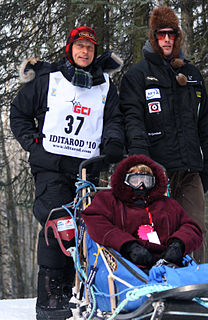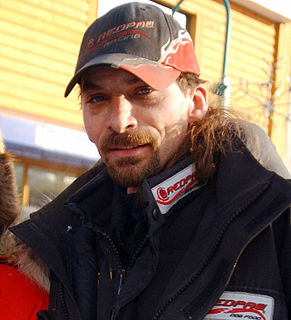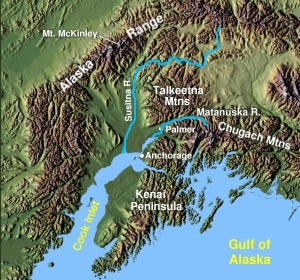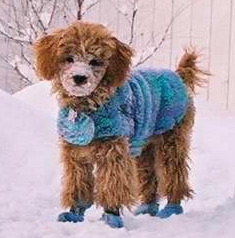
Sled dog racing is a winter dog sport most popular in the Arctic regions of the United States, Canada, Russia, Greenland and some European countries. It involves the timed competition of teams of sled dogs that pull a sled with the dog driver or musher standing on the runners. The team completing the marked course in the least time is judged the winner.

Martin Buser is a champion of sled dog racing.

The Yukon Quest 1,000-mile International Sled Dog Race, or simply Yukon Quest, is a sled dog race run every February between Fairbanks, Alaska, and Whitehorse, Yukon. Because of the harsh winter conditions, difficult trail, and the limited support that competitors are allowed, it is considered the "most difficult sled dog race in the world", or even the "toughest race in the world"—"even tougher, more selective and less attention-seeking than the Iditarod Trail Sled Dog Race." The originator envisioned it as "a race so rugged that only purists would participate."

Tustumena Lake is a lake on the west side of the Kenai Peninsula in southcentral Alaska, within Kenai National Wildlife Refuge and near the town of Kasilof. Access is only via the Kasilof River, there are no roads that lead directly to the lake.

King moved to Alaska in 1975 and began racing in 1976. A successful sled dog racer, he won the Yukon Quest in 1989, and the Iditarod Trail Sled Dog Race in 1993, 1996, 1998, and most recently, in the 2006 Iditarod. Five other mushers have won the Iditarod four times and only one, Rick Swenson has won it more often. King was 50 years old when he won the 2006 Iditarod, which made him the oldest musher to win the event, a distinction he held until 2013 when Mitch Seavey won at age 53. As of 2015, he has competed in 26 Iditarods. His "Idita-Rider" for the 2005 Iditarod was a child sponsored by the Make-a-Wish Foundation. King has also won many other sled dog races. He continues to race and has a kennel near the entrance of Denali National Park.

The ceremonial start of the 33rd annual Iditarod Trail Sled Dog Race across the US state of Alaska began in Anchorage on March 5, 2005 at 10 am AKST, and restarted in Willow the next day at 2 pm. After covering 1,161 miles (1,868 km) of wilderness, musher Robert Sørlie, an airport firefighter from Norway, crossed the finish line under the "burled arch" in Nome on March 16 at 8:39 am AKST. After taking care of his dogs, and an inspection to make sure all the mandatory equipment was in his sled, Sørlie was declared the winner by Race Marshal Mark Norman, with a time of 9 days, 18 hours, 39 minutes, and 31 seconds and won US$72,066.67 and a new truck. When asked how it felt to win a second time, Sørlie said "it feels good, I'm ready for breakfast." His team of dogs averaged 4.65 mi/h (7.58 km/h). The Red Lantern in last was Phil Morgan, an Alaska Airlines pilot, and when he crossed the finish line on March 21 at 8:02 pm AKST, the Widow's Lantern hanging on the burled arch was extinguished, which signaled the end of the race.
Joe Redington, Senior was an American dog musher and kennel owner, who is best known as the "Father of the Iditarod Trail Sled Dog Race", a long distance sled dog race run annually from the Anchorage area to Nome, Alaska.
Dorothy G. Page was best known as "Mother of the Iditarod Trail Sled Dog Race", the 1,049-mile dog sled race across the U.S. state of Alaska.
The Junior Iditarod Sled Dog Race, or Jr. Iditarod, is a 148- to 158-mile sled dog race for mushers between the ages of 14 through 17, which is patterned after the 1,150-mile Iditarod Trail Sled Dog Race that is said to be 1,049 miles. The race is held outside Anchorage in the U.S. state of Alaska, and was the first long-distance race for juvenile mushers.

Lance Mackey is an American dog musher and dog sled racer from Fairbanks, Alaska, who is a four-time winner of the 1,000-mile Yukon Quest and four-time winner of the Iditarod Trail Sled Dog Race.
The following is a list of sporting venues, events, and teams based in Alaska.
Iditarod: Toughest Race on Earth was a 2008 American reality television miniseries on the Discovery Channel that featured the 2008 Iditarod Trail Sled Dog Race from Anchorage to Nome, Alaska.
The Alpirod is a defunct 1,000 kilometres (621 mi) sled dog stage race in Southern Europe. Its name comes from a combination of the Alps, where the race took place, and the Iditarod Trail Sled Dog Race, upon which the race was based. The competition consisted of a 14-day stage race in 11 cities in four countries: Italy, Germany, Austria and France. The competition consisted of multiple short races separated by evening breaks, similar to cycling's Tour de France. At the time, it was the largest sled dog race outside North America. The race was organized by Armen Khatchikian, an Italian Iditarod competitor who hoped to bring a form of that race to Europe. It first took place in 1988, and the inaugural race was won by Alaska racer Joe Runyan. In 1989, the race was won by Kathy Swenson. She was the first woman to win the race. In 1990, Alaskan Roxy Wright Champaine won the race, becoming the third American winner. In 1992, the race was won by Nenana, Alaska musher Jacques Philip, who went on to win the race three times.

The Race to the Sky is a long-distance sled dog race held annually in Montana. There are several divisions offered at different distances. The longest race was originally a 500-mile (800 km) race but is currently 350 miles (560 km). It is a qualifying race for the Iditarod Trail Sled Dog Race and is sometimes called "The Iditarod of the Lower 48."

Aliy Zirkle is a champion of sled dog racing.

Brent Sass is an American dog musher who won the 1,000 mile Yukon Quest international sled dog race from Whitehorse, Yukon to Fairbanks, Alaska in 2015. He is well known for rescuing other mushers along the Yukon Quest trail throughout his dogsled racing career. In 2011, the rescue efforts of Sass and his then-lead dog Silver at American Summit in blizzard conditions led to the introduction of the Yukon Quest's Silver Award that recognizes sled dogs that have performed acts of heroism on the trail.
Nicolas Petit is a French dog musher. He competes in the Iditarod Trail Sled Dog Race and has finished in the top ten a number of times, including in 2013, 2015, 2016, 2017, and 2018. He won the Copper Basin 300, Knik 200, Kobuk 440, and Tustumena 200 in 2018.













